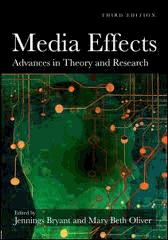|
|
|
Empathy Experts:
Mary Beth Oliver
Mary Beth Oliver & Edwin
Rutsch: Dialogs on How to Build a Culture of Empathy with Journalism We talked
about the role of the media in fostering a culture of empathy. Needless to
say, the media is doing a lot to inhibit empathy at the moment.
Mary conducted a study titled, 'The Effect of Narrative News Format on
Empathy for Stigmatized Groups'. "The primary aim of this study
was to evaluate the extent to which news story format (narrative vs.
non-narrative) can initiate empathic processes that produce more
favorable evaluations of stigmatized groups." The study showed that
narrative stories stimulate more empathy and compassion
Mary Beth Oliver &
Edwin Rutsch: Dialogs on How to Build a Culture of Empathy with
Journalism
Transcripts
00:00 Introduction
(transcription pending)
(Video
Transcriptions: If you would like to take empathic action
and create a transcription of this video, check
the volunteers page. The transcriptions will make it easier for
other viewers to quickly see the content of this video.) The Effect of Narrative News Format on Empathy for Stigmatized Groups The primary aim of this study was to evaluate the extent to which news story format (narrative vs. non-narrative) can initiate empathic processes that produce more favorable evaluations of stigmatized groups. Participants (N = 399) read one of two versions of a story that described health care–related dilemmas for either immigrants, prisoners, or the elderly. Narrative-formatted stories produce more compassion toward the individuals in the story, more favorable attitudes toward the group, more beneficial behavioral intentions, and more information-seeking behavior.
May 30, 2012:
"How the news media tell a story can make those who
consume the story more compassionate and willing to act and help others.
According to Penn State researchers, news reports can boost empathy
toward stigmatized groups, particularly if they go beyond factual
information to include stories that more effectively trigger emotional
responses."
|
||||||||||||
|
||||









